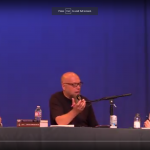In a recent blog post, Michael Pahl wrote the following about Jesus and “hell”- or rather, Gehenna, a reference to the Hinnom Valley. But what was the significance of that valley? The idea that it was a burning trash heap seems to come into existing literature only later. And so Pahl suggests looking at Jeremiah 7 instead. From that text, Pahl draws a number of conclusions:
1) The fires of Gehenna were made by humans, not by God.
In fact, 2) God abhorred the fires of Gehenna.
And why did God so despise the fires of Gehenna? Because 3) they were the epitome of senseless human violence, particularly violence against the most vulnerable…
4) Gehenna symbolizes God’s judgment, but this divine judgment is not an “angry God directly inflicting violence upon sinners for eternity” judgment.
It’s a 5) “reap what you sow” judgment—if we sow violence, injustice, and oppression, we will reap that violence, injustice, and oppression upon ourselves, in very human, very natural, ways, within human history and not beyond it.
It’s a 6) judgment specifically upon the powerful, those with social or economic or political or religious clout, for the ways in which they oppress and commit violence against the weak, those on the bottom rungs of our social and economic and political and religious hierarchies.
With this background on Gehenna in mind, we can now fully appreciate Jesus’ words on hell in the Gospels.
Jesus isn’t talking about a “literal hell” where unrepentant unbelievers go after they die to be tortured in God’s inferno for all eternity.
He’s talking about the violent consequences of our own violent actions, right here in our lived lives, right here in human history.
He’s talking about such consequences especially for those who use their power to oppress the weak, who live in wealth in indifference to the poor, who have the means to care for the sick and clothe the naked and feed the hungry but refuse to do so, who rest secure in their status and privilege while committing grave injustices against the vulnerable and the marginalized.
And he’s talking in particular to the uber-religious, the people who think they’re on God’s side because they believe the right things or do the right rituals—but they burden others with moral demands while doing nothing to help them, they focus on minor moral issues while neglecting the weightier matters of justice and mercy and allegiance to God above all other powers that be.
These are sobering words, serious warnings, for every age and certainly our own. But all this is right in line with the good news of Jesus and Jesus’ way of love.
After all, there’s nothing more loving, nothing more like Jesus, than standing in solidarity with the powerless, the stepped-upon, the pushed-to-the-side, and standing up to the oppressive powers that be—whatever the cost to ourselves.
And it is this hell of our own harmful actions and their destructive consequences—our sin and all its death—that Jesus has come to save us from. Jesus calls us to leave behind our damaging, violent ways and follow him in his path of compassionate, inclusive, forgiving, self-giving love. If we don’t do this the result will only be death for ourselves, for others, for the world. But if we do this we will find life, full and flourishing life for all.
It’s an amazing post, and so I encourage you to go to Michael Pahl’s blog and read it in its entirety. Then let me know what you think of it.













